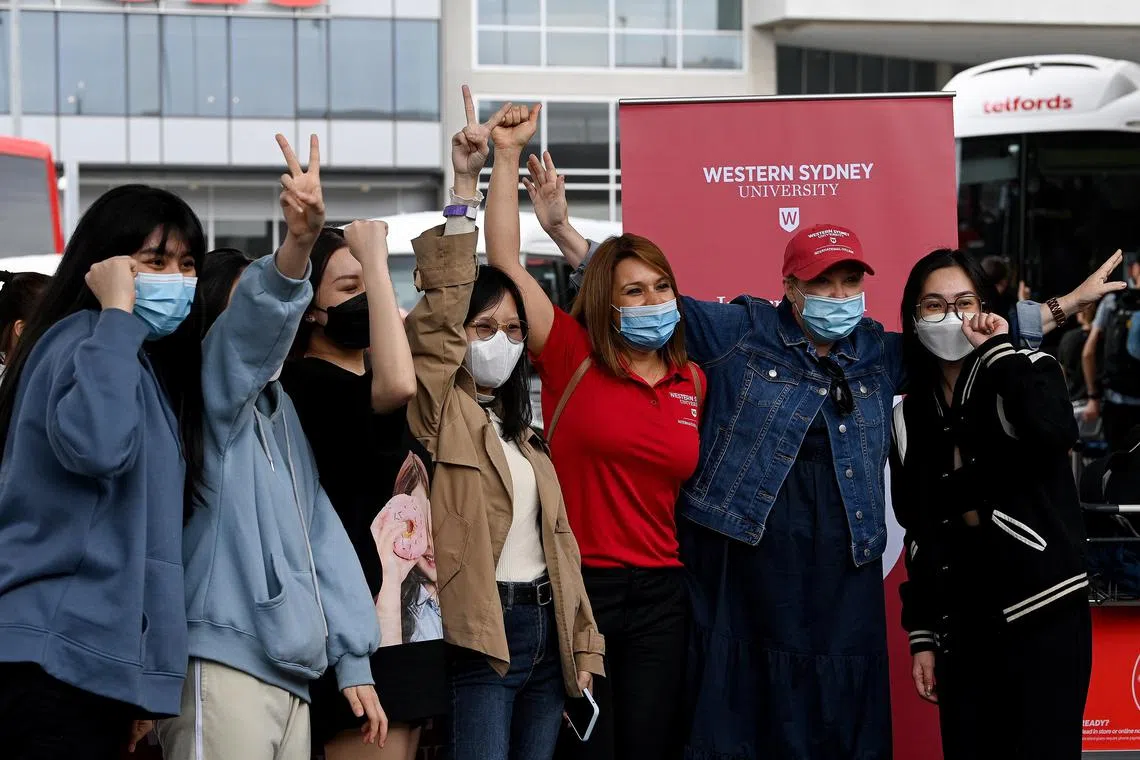International students in Australia face accommodation crunch and soaring rents
Sign up now: Get insights on Asia's fast-moving developments

International students with university representatives after arriving at Sydney International Airport in December 2021.
PHOTO: EPA-EFE
SYDNEY - International students are starting to flood back to Australia but face a dire lack of rental accommodation, which is set to worsen following China’s move to end recognition of online degrees.
Australia is already suffering from spiralling rents
In Sydney, average weekly rents per property have increased 11 per cent in the past year to A$679 (S$624), but can be much higher in areas around university campuses. In Sydney and Melbourne, availability is at a record low, with just 1 per cent of rental properties currently available for lease.
The lack of properties is causing serious challenges for international students, who have begun to head back to Australian universities in large numbers following the removal of travel curbs imposed due to the Covid-19 pandemic.
Purpose-built student accommodation around several major universities in Sydney, Melbourne and Perth is already largely full, particularly in inner-city areas.
Around Sydney University, for instance, studio apartments cost up to A$800 a week and a bed in a two-bed studio costs about A$420 a week, but these are almost all occupied for the first semester of this year. University-owned housing is reportedly currently full, though assistance is being offered to students who are struggling to find accommodation.
“Emergency accommodation is offered to students who need it – along with financial bursaries to help cover rent, food, and other general living and study expenses,” a spokesman for the university told The Sydney Morning Herald.
The shortage of accommodation is about to become much worse with an expected influx of about 40,000 Chinese students, after Beijing announced in January that it would recognise only foreign degrees earned in person.
Chinese students have since been rushing to arrange accommodation in Australia. Landlords say some have been offering to pay rents that are much higher than advertised prices, or to start paying rent immediately, even if they would not be arriving for weeks. Some students have also been looking for housing in suburbs far from their campus.
A Sydney real estate agent, Ms Alison Chang, told ABC News this week that she listed an apartment in the inner-city suburb of Ultimo – which is close to several university campuses – and had 50 inquiries within two days. She said one applicant offered to pay six months’ rent in advance.
“We’ve seen a lot of people applying for the property before the open house has actually started,” she said. “They’re not just looking at the suburbs near the universities... they are expanding out.”
But analysts say the surging demand, particularly from Chinese students, could fuel further rent rises of at least 5 per cent in inner-city areas of Sydney and Melbourne. Prices are also expected to rise in areas with decent public transport options.
China is the largest source of foreign students in Australia. Last year, there were 613,327 foreign students at Australian educational institutions such as universities, schools and other colleges. Of these, 155,348 – or 25 per cent – were from China, followed by 99,739 (16 per cent) from India and 56,847 (9 per cent) from Nepal. There were also 6,169 students (1 per cent) from Singapore.
Universities typically set aside on-campus accommodation for students, but much of this is full – partly because some students are staying there longer due to off-campus housing shortages.
In Perth, StudyPerth, which promotes international education in Western Australia, has estimated that some 5,000 beds were still needed to house students. The organisation is reportedly working with the state government to try to encourage hotels to offer discounted rates to international students.
Universities have even appealed to staff and alumni to rent out spare rooms to international students.
A November report by the Student Accommodation Council, an advocacy body for the purpose-built student accommodation sector, found that much of the purpose-built accommodation for students was already at capacity. It has been urging governments in Australia to encourage more investment in student accommodation.
“The last thing we want is our housing supply or rental market crisis to become a handbrake on our education sector because we have nowhere for prospective students to live,” said the council’s executive director Torie Brown.



